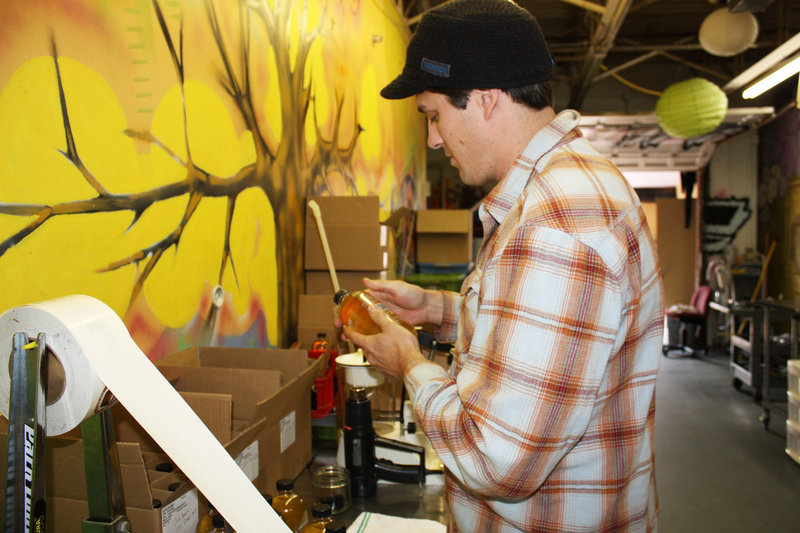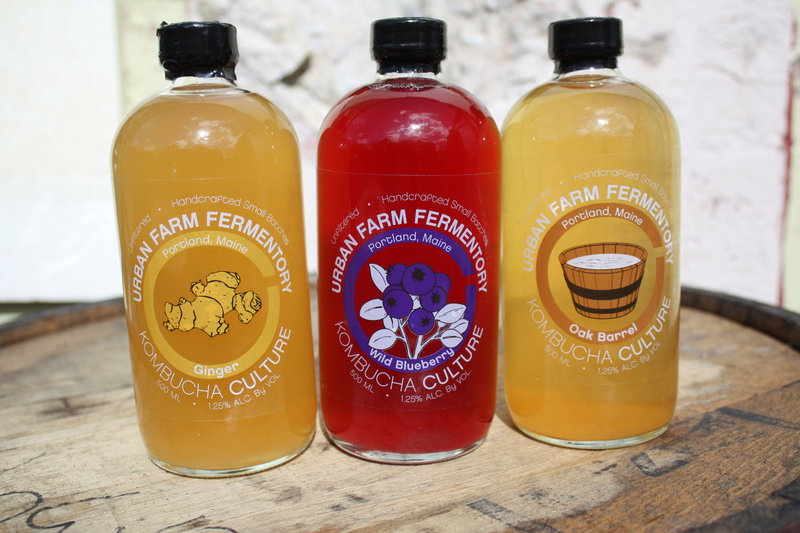Brewer Reid Emmerich isn’t kidding when he says the new Urban Farm Fermentory Kombucha Culture line is “extremely small scale.” He has the blisters to prove it.
When I caught up with him, Emmerich was hand-affixing labels and caps to hundreds of 16-ounce bottles to prepare for this week’s official launch of the new line.
The company brews about 40 to 50 gallons of kombucha a week, but anticipates doubling or tripling that in the coming months. In contrast, the leading brand, GT’s Kombucha, reportedly sold more than 1 million bottles in 2009.
Kombucha is a tangy, often effervescent, fermented tea beverage, and has been brewed since ancient times. It is widely embraced by the health-food community as a digestive aid and an energy booster due to the priobiotics and B vitamins found in the drink.
The initial release of Urban Farm Fermentory Kombucha Culture offers three varieties: Wild blueberry, ginger and oak barrel, with more flavors to be added in coming months.
“When we started brewing the kombucha, we wanted to do something unique,” said Eli Cayer, who heads Urban Farm Fermentory in Portland. Urban Farm Fermentory is known for its hard cider, inner-city farm and sustainable food classes.
One way Urban Farm is distinguishing its kombucha is by brewing some of it in the oak barrels used to brew the company’s Baby Jimmy hard cider.
Another thing that makes the kombucha stand out from the crowd is the fact that you must be 21 or older to buy it.
To understand this unusual sales requirement, we need to go back to 2010. That’s when Emmerich teamed up with Chris Hallweaver to form the Maine Kombucha Co. The pair rented space at Urban Farm Fermentory, and hoped to brew and bottle the beverage there.
However, when they contacted the Maine Department of Agriculture to begin the licensing process, they were met with skepticism by a department that had never heard of kombucha. After contacting various universities, the regulators received a letter from a Cornell University professor who said the kombucha she tested was well above the .5 percent legal limit for alcohol, a by-product of the fermentation process.
This prompted the state to do its own testing of national kombucha brands sold at Whole Foods Market in Portland. The testing revealed that many brands contained more than a trace amount of alcohol.
A few months later, the federal government got involved, and kombucha was pulled from stores nationwide.
Since then, kombucha has returned to store shelves, but producers have had to take steps to reduce alcohol content by investing in new equipment to pasteurize, water down or filter the brew.
In the meantime, Hallweaver moved to Van Buren to head the start-up Northern Girl vegetable processing business, and Emmerich decided to partner with Cayer, who had received federal approval to produce kombucha under the company’s wine license.
Because the alcohol reduction methods “were pretty costly and would change the product,” Emmerich said he and Cayer decided to market the kombucha as an alcoholic beverage. They say testing shows that Urban Farm Fermentory kombucha contains less than 1 percent alcohol.
“Even though we’re selling our kombucha as an alcoholic beverage, we don’t want it to be associated with getting wasted,” Emmerich said.
This presents a bit of a challenge, because regulations prohibit the makers of alcoholic beverages from mentioning any potential health benefits. It also subjects the product to additional taxes, which Cayer said work out to be about $1 per gallon.
Urban Farm Fermentory has been test marketing the product in select local stores since November, and Cayer said “the feedback has been phenomenal.”
Caitlin Christensen, manager at Rosemont Market on Brighton Avenue in Portland — one of the retailers who’ve sold the test run of the product — said the kombucha has been well-received by the shop’s customers.
“We love it, and it sells really well,” Christensen said. “We put a note on it to let people know it’s local. We originally had it sitting next to the beer, and it didn’t sell well. So we moved it over next to kombucha, and it’s selling really well.”
Christensen said the need for customers to be 21 or older to purchase it hasn’t been an issue.
The fermented beverage is made with organic and fair-traded green tea, black tea and sugar.
While neither tea plants nor sugar cane grow in Maine, Emmerich and Cayer plan to source all other ingredients locally. Wild blueberries have been easy to source from Maine, but the pair is also hoping to source ginger locally. The spicy root is native to tropical areas of Asia. However, last summer, a few Maine farmers experimented with growing ginger in hothouses.
“We grew some ginger last year in our greenhouse,” Cayer said. “And we’ve talked to farmers about growing some for us this year as well.”
Urban Farm Fermentory Kombucha Culture retails for around $4 a bottle and is distributed to locally owned health food stores and neighborhood markets from Belfast to Wells.
Now that the state is allowing alcohol sales at farmers markets, Urban Farm Fermentory applied for a spot in the Portland markets, and hoped to sell its kombucha and hard cider there Wednesdays and Saturdays. Even though Urban Farm Fermentory is one of only two farms in Portland, it wasn’t approved to participate in the market this year.
Despite being denied a spot at the Portland Farmers Market, Urban Farm Fermentory is pushing ahead with its plans to bring Maine-made kombucha to the people of the Pine Tree State.
“Our intention from the beginning was to provide local people with a local product,” Emmerich said.
Staff Writer Avery Yale Kamila can be contacted at 791-6297 or at: akamila@pressherald.com
Twitter: AveryYaleKamila
Send questions/comments to the editors.




Comments are no longer available on this story